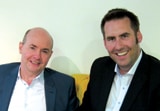If you are reading this edition of The Directory, chances are you’re looking for another advertising agency, which may mean a previous relationship has run its course. Even if you have not reached this point, it is always worth taking a step back to consider the nature of the relationships you currently have and what you can expect from them.
To understand the client/agency relationship in 2012, let’s first think about how it has had to change as the environment in which it needs to thrive has evolved. The old days of large national salesforces selling drugs direct to doctors are clearly over. Regional and global campaigns now need to transcend geographical and socio-economic boundaries.
As such, this boundary blurring simplifies at a conceptual level but becomes complex in the real world when applied to diverse languages, cultures and an increasingly diversifying and fragmenting audience. Healthcare professionals must still believe in and remember our brands in order to prescribe, but the decision as to which drugs they have available to them is, in the main, determined by others way beyond the four walls of the consulting room.
As marketers have had to adapt to this changing context, their agencies have to adapt to remain relevant. The better ones not only add value to the relationship but also strive to enhance the industry.
While there are many ways in which the client/agency relationship can be improved, there are four areas that are really critical to getting it right:
- strategic excellence
- long-term commitment
- quality of delivery
- inclusion.
Striving for strategic excellence
Strategically, clients should expect more from agencies and this has led to the emergence from the consumer world of the flourishing planning discipline. Planning strengthens the client/agency relationship by integrating different departments and levels across the organisations.
Simplifying market complexities to uncover a universal human insight is the foundation of all good marketing. Stewarding that emerging strategic thought to become a fantastic, creative brand offering that all can rally around takes skill, dedication and diplomacy.
The best and longest lasting client/agency relationships are genuine partnerships with two groups of people collaborating to solve the same problem. You can tell a strong relationship if you walk in on a client/agency meeting, eavesdrop for 10 minutes and can’t tell who works for the client and who for the agency. It is just a group of people working together.
That is why clients get frustrated when an agency changes the team frequently or when the senior people who fronted the pitch are nowhere to be seen once the day-to-day business gets underway. In fact in our experience the senior people are not at the heart of a strong relationship, it’s the ‘workers’ that the client most appreciates; the people who know the brand, know the market and know the data, and can be relied on to make the trains run on time.
Attention to detail has always been at the foundation of good client service but now agencies must combine this with super-fast response times. Get either of those ‘hygiene factors’ wrong too often and the client will be making good use of The Directory.
Another mistake on the part of agencies is not to make the client part of the process. Many clients can find working with agencies an uncomfortable experience as the agency keeps them at arm’s length only to unveil its big idea at the last minute.
Far better to keep the client involved throughout, sharing a range of ideas at an early stage so he takes ownership of the campaign as it evolves and progresses. Clients should feel their interaction with the agency is one of the really fun and exciting parts of their job – and agencies should feed off this enthusiasm.
When delivering its part it is all too easy for the agency to forget that clients have a complicated job in coordinating many different agencies. VCCP Health recently worked on the launch of Zelboraf for Roche, whose international business leader, Richard Wright, took a refreshing approach. “A key factor that contributed to the success of the recent brand launch was having one extended team working together, made up of agencies and Roche. In addition, the agencies were empowered to work together, driving key deliverables for the team.”
Reach for the sky
So what advice would we give clients in order to get the best out of their agencies? In our experience the clients that get the best work and the best service are those that truly understand what their agency can deliver and can trust the agency to deliver it.
Agency staff will go that extra mile for a client they enjoy working with. Clients get reputations in agencies. Client companies should aim to be the piece of business that everyone in the agency wants to work on.
That’s not to say they should be lenient in any way. Set high standards and clear objectives and if the agency falls short tell it very clearly why.
Ultimately the client/agency relationship is about delivery. The success of this partnership should be measured by what the brand achieves as a result. That said it is far better all round if everyone enjoys the journey as well.





